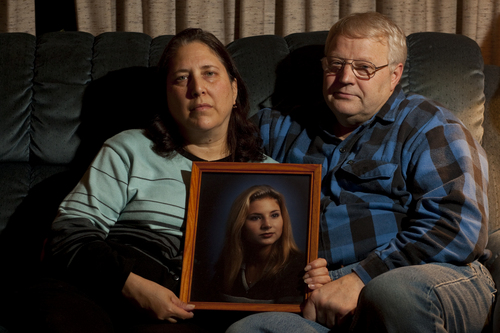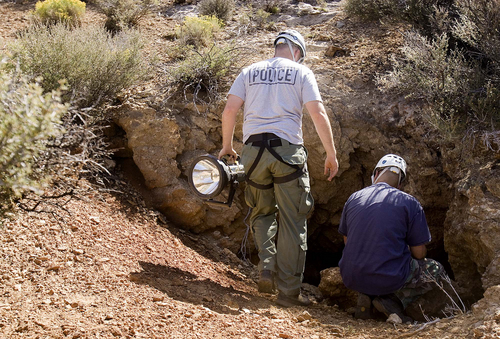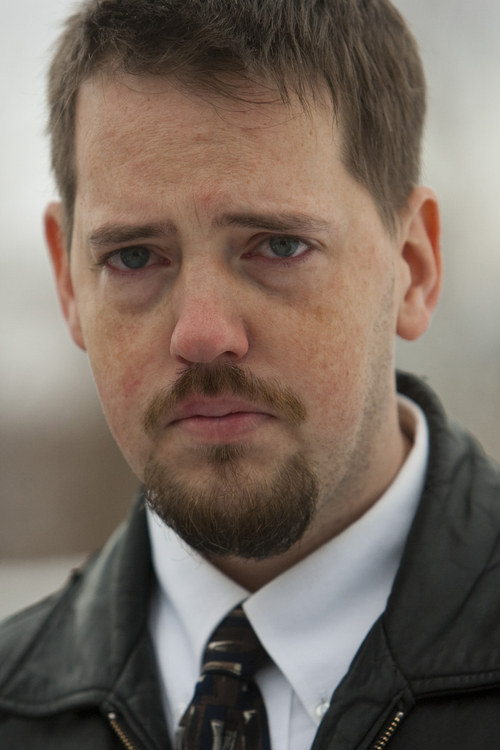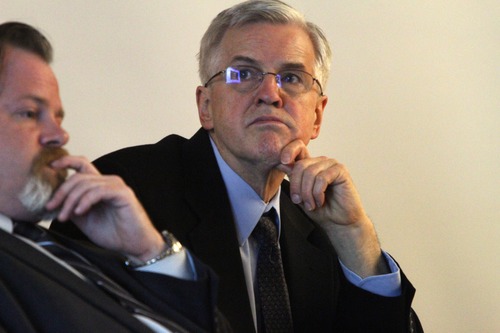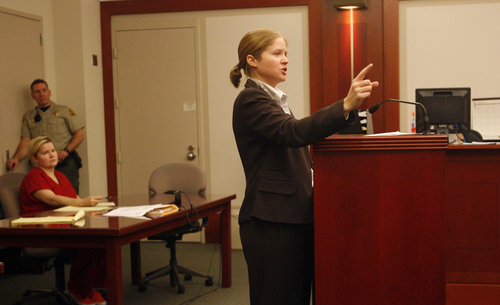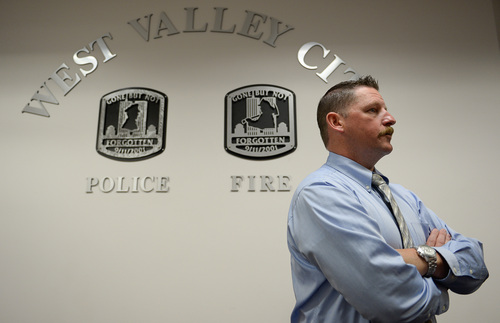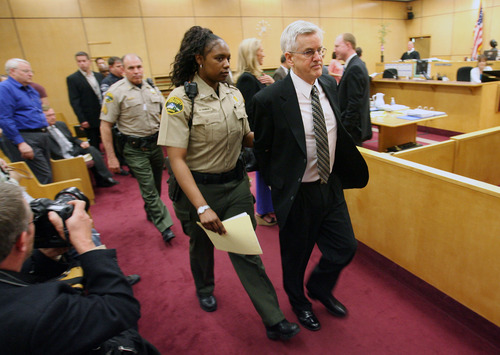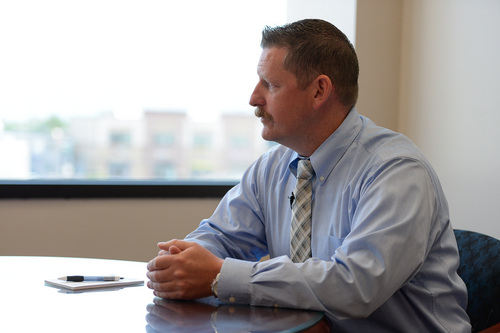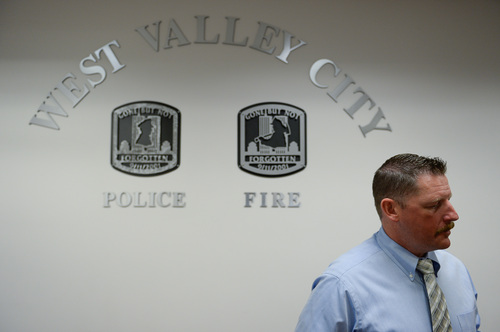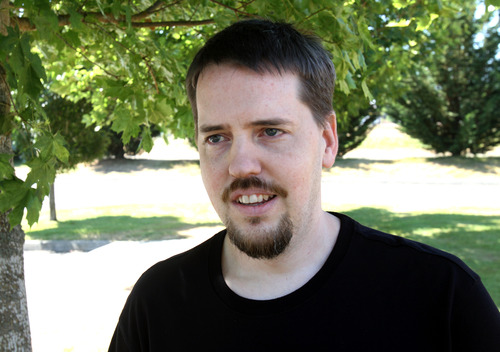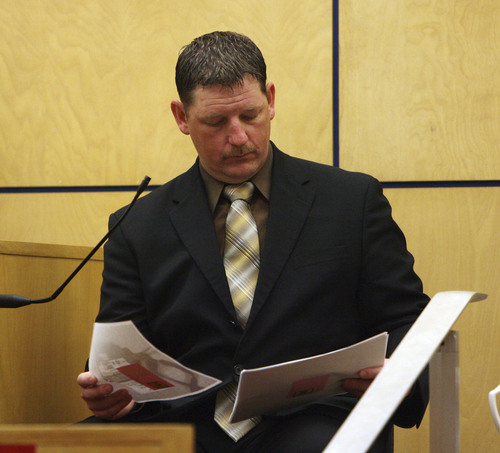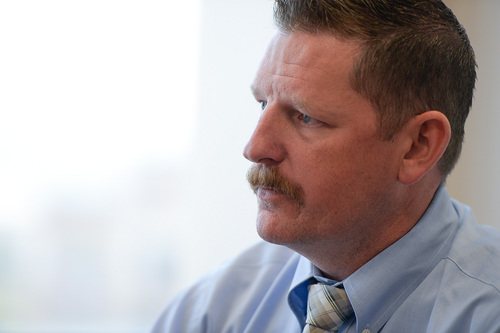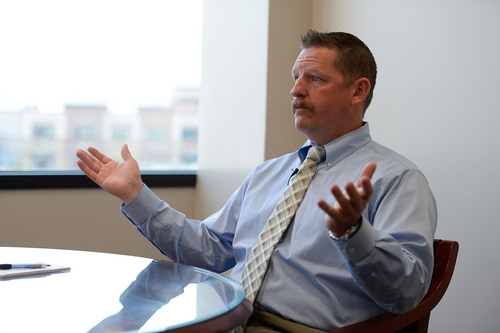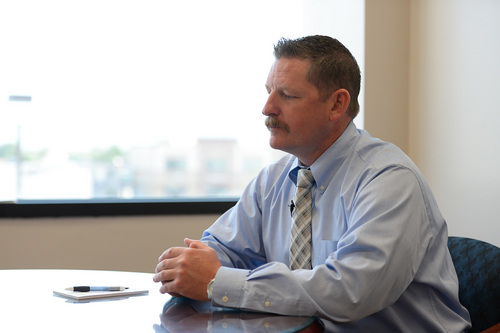This is an archived article that was published on sltrib.com in 2014, and information in the article may be outdated. It is provided only for personal research purposes and may not be reprinted.
West Valley City • Susan Powell had been missing less than a day, and her husband, Josh, had just returned home from what he said was a winter camping trip.
Among those in front of his house waiting for him was Detective Ellis Maxwell. He approached Josh Powell's minivan and began asking where Susan was.
Maxwell remains on the case. But 4½ years after he asked Josh those first questions, Maxwell still doesn't have any answers.
"There's no evidence to support what happened to her," Maxwell said of Susan.
Maxwell, the lead detective in the disappearance, believes Josh kidnapped and murdered his wife, and said prosecutors would have filed criminal charges against Josh in 2012 had he not committed suicide after murdering his two sons.
However, Maxwell offers no specific theories about what happened to 28-year-old Susan, who was last seen alive Dec. 6, 2009.
Had the case gone to trial, the prosecution's argument would have been that no one but Josh had the access and opportunity to kill her.
Maxwell said there was no sign of an altercation or crime in the Powell's West Valley City home.
There is no evidence of poisoning, as Susan's supporters have theorized, Maxwell says. And he doubts that Josh and his brother moved Susan's body days after the disappearance.
"There's nothing to support that Josh murdered her other than circumstantial evidence," Maxwell said.
"I have no idea," Maxwell said of Susan's whereabouts. "She could be in a mine. She could be anywhere."
—
Search begins • Maxwell met with The Salt Lake Tribune on Wednesday at the West Valley City police headquarters. It was the first time he had spoken to a reporter about the Powell case.
That day in the Powell driveway, Josh's first words to Maxwell were a lie. The detective asked Josh why he didn't answer his phone. Josh, according to court documents, said he shut it off to conserve the battery since he forgot the charger. Maxwell could see the charger in the van's console.
Josh never got more cooperative. Maxwell interviewed Josh that day in the driveway and then at a police substation. Maxwell interviewed Josh again the next day at the police department. Maxwell said Josh's answers were either, "I don't know, I don't remember," or he'd simply avoid answering at all, offering very few lies Maxwell could use against him later.
Maxwell became convinced Josh had something to do with the disappearance when he refused to take a polygraph at the police department. But there was no body or witnesses. And the Powells' 2- and 4-year-old sons gave conflicting accounts of what occurred.
Maxwell let Josh go home.
—
Had to act • On Wednesday, Maxwell said he believes Josh had considered killing his wife and had a concept of how he would do it, but was compelled to act suddenly. Weather forecasters had been warning the public of an impending snowstorm, but Josh decided to venture ahead anyway.
"That tells me that something happened that evening he had to act on," Maxwell said.
Once Josh decided to act, Maxwell said, he developed a plan and decided he had to stick to it, even when circumstances dictated he should not have — such as when he told Maxwell he didn't have his cellphone charger.
"He just couldn't deviate from it," Maxwell said. "So when he arrives at the house and I approach him, he was stunned."
Maxwell is less sure of how Josh kidnapped and murdered his wife. Both an attorney for Susan's family and authors of a recent book on the Powell case have suggested that Josh, who rarely cooked, poisoned his wife with a pancake dinner he made for the family on the last afternoon anyone saw Susan. But the lone pancake the police found in a wastebasket contained no drugs, Maxwell said, and there was no other evidence of sedatives that could have been used to drug Susan.
On Dec. 8, 2009, Josh rented a car at Salt Lake City International Airport, drove it for about 800 miles and returned it to the airport two days later. It's been theorized that Josh, with help from his brother Michael, moved Susan's body during this time. But Maxwell doubts that happened.
"That just seems bizarre for Josh to go dump the body one place and then a week later they go move the body someplace else," Maxwell said. "That's pretty risky."
Plus, police searched Michael's 1997 Ford Taurus at a salvage yard in September 2011 and did not find Susan's DNA.
—
Questions for jury •As Maxwell and other West Valley City detectives sought to figure out what happened to Susan, they obtained search warrants, subpoenas, interviewed people who knew the Powells and conducted surveillance on Josh.
Maxwell said that there was a minimum of four West Valley City detectives and as many as 15 working on the Powell case from the first few days of the disappearance until May 2013.
The Powells were from Puyallup, Wash., and Josh moved back there with his sons days after his wife disappeared. Maxwell said he has made 10 to 15 trips to Washington. At one point, he said, the police department considered renting an apartment there to reduce lodging costs.
What evidence police found against Josh was collected in those first few weeks, Maxwell said. In early 2010, he met with Deputy Salt Lake County District Attorney Sandi Johnson.
The decision was made, Maxwell said, to not file charges against Josh for at least 12 months.
In an interview Thursday, Johnson didn't recall putting a specific time frame on when to file charges, but she said they decided to give West Valley City more time to investigate.
"It was never a question of who did it," Johnson said. "It was a question of, 'Can we prove beyond a reasonable doubt to a jury that she's dead?'"
Detectives also needed to investigate whether someone other than Josh was responsible for the disappearance.
—
Trap for Josh • One of the people Maxwell had to investigate was Steve Powell, Josh's father. Police learned early on that Steve was infatuated with his daughter-in-law. Maxwell knew if Josh was ever charged with the kidnapping and murder, a defense attorney would want to point the finger at Steve. Detectives eventually determined Steve was in Washington on Dec. 6 and 7, 2009, and found no evidence he aided Josh after the fact, Maxwell said.
Meanwhile, West Valley City police searched or eliminated as possibilities about 400 mines in western Utah and eastern Nevada, where Josh could have disposed of his wife's body.
Susan's parents, Chuck and Judy Cox, kept their daughter's story in the news and stayed in touch with West Valley City police. But the Coxes have said they seldom received specific information about what police knew or when Josh might be charged with a crime.
Maxwell said he and detectives had to ensure information didn't reach Josh or potential witnesses and endanger their case. He said he once apologized to Chuck Cox for saying he was going to put Josh in jail and then not delivering.
The case entered its second year with no new evidence of what happened the night Susan vanished. Maxwell and Johnson said Josh could have been charged with obstruction of justice for lying to Maxwell and making other false statements to police. But if Josh were in jail or prison for that, it would have made it harder for him to do something police wanted him to do — incriminate himself in connection with Susan's disappearance.
In August 2011, West Valley City police and Johnson persuaded a judge to issue a warrant to tap Josh's cellphone. Police decided to try to elicit a reaction from Josh by launching new searches for Susan near Ely, Nev., and then near Topaz Mountain in Utah.
Maxwell insisted Wednesday the searches were legitimate, but they also were designed to let police hear what Josh was saying on the telephone about what happened to his wife.
"We didn't have anything to lose," Maxwell said.
The wiretap remained into October 2011, but Josh said little on the phone that was useful. He made one comment about how police wouldn't find Susan's body near Ely, according to court documents, but he said nothing that was obviously incriminating.
—
Steve is arrested •Maxwell said there were emotional highs and lows throughout the investigation. One unexpected lift came in August 2011, when Steve showed off some of Susan's journals to reporters and read excerpts that he claimed showed she was emotionally unstable and capable of walking out on her family — a contention Steve and Josh had started offering reporters a year earlier.
When Steve showed off the journals, "that was exciting," Maxwell said. It gave police enough probable cause to obtain a new search warrant for Steve's Puyallup home, where Josh also was living. Besides the journals, police seized more computers and digital storage devices. That's how West Valley City detectives found photographs Steve took of neighbor girls in various states of undress.
Steve eventually was convicted of 12 counts of voyeurism. Maxwell didn't take any pleasure in the arrest. He was investigating a kidnapping and murder, and the voyeurism case didn't do anything to help him.
—
The fire •On Feb. 5, 2012, Maxwell was following up on leads from the wiretap and other items. It was Super Bowl Sunday and Maxwell was preparing to watch the game at home when a detective from the Pierce County, Wash., Sheriff's Department called. Josh had ignited his home in Graham, Wash., with himself and his sons, 7-year-old Charlie and 5-year-old Braden, inside.
Maxwell said he felt a "punch to the chest." Maxwell suspected Josh of killing his wife, but did not believe he was a threat to his sons.
"Now, as an investigator and an organization," Maxwell said, "you do not get that satisfaction of holding someone accountable."
The double-murder-suicide became ammunition for people who already thought West Valley City police should have arrested Josh. Two months after the deaths, search warrants were unsealed revealing the evidence against Josh.
"There is direct evidence. There is circumstantial evidence. There is motive," said Pierce County prosecutor Mark Lindquist, who told The Associated Press he would have charged Josh with murder. "There is everything but the body."
Maxwell said he hasn't paid attention to the criticism. "It's ignorance, is all it is."
Both Maxwell and Johnson said the Salt Lake County district attorney's office likely would have charged Josh with kidnapping, murder and obstruction of justice later in 2012. Police had eliminated other suspects. Enough time had passed with no sign of Susan, Maxwell said, that it would have been possible to persuade a jury that she was dead.
Johnson said if the case had gone to trial, she would have presented circumstantial evidence that Josh kidnapped and murdered his wife — and evidence that no one else could have.
Johnson called the search for Susan one of the most thorough investigations she's seen in 12 years as a prosecutor.
"They followed every lead," Johnson said. "They talked to thousands of people. They went through thousands of documents. They went outside the box to think of different investigative techniques to use."
Maxwell and West Valley City police continued investigating the disappearance despite Josh's death. They interviewed Michael Powell in Minneapolis, where he was a doctoral student at the University of Minnesota. He denied involvement, but was concerned when police said they found his Taurus, which was suspected of moving Susan's body, according to police documents. Michael died Feb. 11, 2013, by jumping off a building in Minneapolis.
Maxwell believes Michael knew something, and that it contributed to his suicide. He communicated with Josh by encrypted email that West Valley City and federal authorities still have not been able to decode. But Maxwell said there's no evidence Michael assisted his brother Dec. 6 or 7, 2009.
There's also no evidence, Maxwell said, that Josh shared information about his wife with other relatives.
—
Still assigned • Last year, West Valley City stopped actively investigating Susan's disappearance. The case still is considered active and Maxwell is still assigned to evaluate new tips. Recently, people who follow a Facebook page dedicated to Susan have been emailing the police department about a wedding band someone found in Weber County. The name "Susan" is inscribed, but there's no evidence it belongs to the missing woman, Maxwell said.
Maxwell is not willing to let someone else take over the case. He said he even turned down the opportunity to take a test that would have made him eligible for a promotion. The promotion would have required him to leave the Powell case.
"To pass this case onto someone else, it would take months for them to go through the ins and outs," Maxwell said.
But Maxwell is eligible to retire in 17 months. He is finishing a bachelor's degree in psychology and plans to pursue a master's degree, too. He wants to start a consulting business that helps police forces improve the work environment. Improving leadership and placing more value on employees and their mental health could increase retention and decrease suicide rates among cops, Maxwell said.
Maxwell says he would make no significant changes to how he and West Valley City investigated the Powell case.
"There's not one thing that I could have done differently," he said, "that would have changed the outcome or sped up prosecution."
Twitter: @natecarlisle —
About West Valley City Det. Ellis Maxwell
Maxwell, 40, is a husband and father of two daughters.
He has been a police officer for 18 years and has spent 13 of those years at West Valley City — his hometown. He transferred to the investigations unit in 2003. The next year, he spent four weeks at the Salt Lake County landfill helping look for the body of Lori Hacking. Her husband, Mark Hacking, murdered her and placed her body in a Dumpster.
Maxwell said the Hacking search — which proved successful — taught him to stay focused on the task and not get discouraged. It was good preparation for the Powell case, he said.


